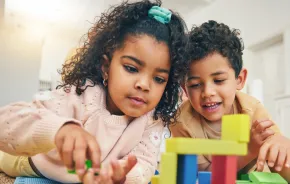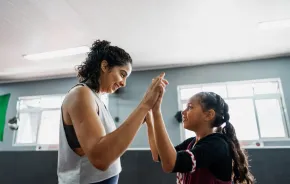
Last night, I woke from a deep slumber to the sound of my 16-year-old daughter walking down the stairs because she couldn’t fall asleep.
I met her on the landing and then tucked her into bed. The tension of her nighttime ruminations filled her room. She said her mind was wide awake.
While I mumbled suggestions, I recalled how my teenage brain loved to ruminate. Does evoking my history help when my daughter needs my assistance?
It does not: She is not me.
Still, my anxious ways mean I’ve learned how to turn a brain’s thought machine off. I play my guided meditation app so we both can hear it while I sit with my back against her bed. I’m not close enough to hear her fall asleep. Yet I feel the tension escape out her open window and I know when she’s no longer awake.
This is what it’s like parenting a teen: The past comes rushing at me continuously, like a wave returning to shore. I fall in its tidal motion: I mark my memories alongside my daughter’s experiences.
I remember playing solitaire, my bedroom wall cold while the rest of my family slept.
I don’t remember failing geometry tests like my daughter is failing hers. Yet there’s my high school friend tutoring me with M&Ms as rewards.
I remember working at summer camp, coming home for my surprise 16th birthday party but feeling more like myself when surrounded by the college-age counselors at camp.
I don’t remember learning how to drive. I do remember failing my driving test and passing the next day after not prepping for the license-picture snap.
I remember talking on the phone as soon as I got home from school, the cord stretching through the small opening between my shut bedroom door and its frame.
When I time-travel, I feel closer to 16 than 47. It’s nice to sit on the railroad tracks and kiss that boy; to stretch my legs into the run along the lake; to jump out of bed at 6 a.m. to help in the camp kitchen.
But snap: I consciously shut the past’s door and step back into the now. There’s my teen who can’t wait for summer because she’ll get to be a camp counselor again. I’m straining to hear her breathing as I grab my phone off her pillow. I’m listening to her plan for passing her next geometry quiz. I’m sobbing as I drive to pick up her latest birthday cake. I’m listening to her laugh while she FaceTimes a friend.
Having her gone for weeks feels as normal as the waves of alternating grief and joy that washed through me before she turned 16. How I felt wrung out and over-joyed. Maybe it’s supposed to feel like her body is still being wrenched from mine. If it took 31 hours to give birth, why shouldn’t 31 hours of feelings accompany her passage from age 15 to 16?
I push myself past my memories of being her age, instead choosing to really see her. That’s how I help my teen walk her own path.
She — not I — will have to figure out geometry. She — not I — will have to find a way to soothe her nighttime ruminations. She — not I — will have to master driving.
I won’t cry when she leaves for camp, but I’ll sob occasionally while she’s gone. I’ll birth the next part of our journey with as many tears as it takes, my face bathed in salt water. I’ll greet her with joy upon her return. I’ll tell her I believe she can pass geometry, get her license and fall asleep on her most wide-awake nights without my help. Because somehow part of me is always there.
I repeat the phrase from poet e.e. cummings to myself instead of burdening her with the truth: i carry your heart with me(i carry it in/ my heart)i am never without it.











